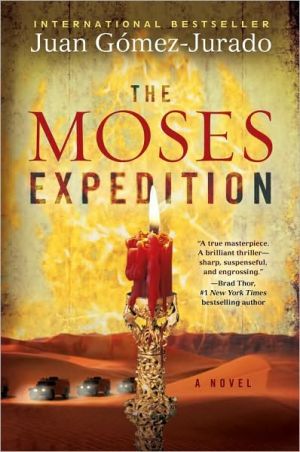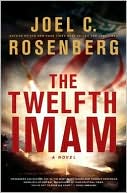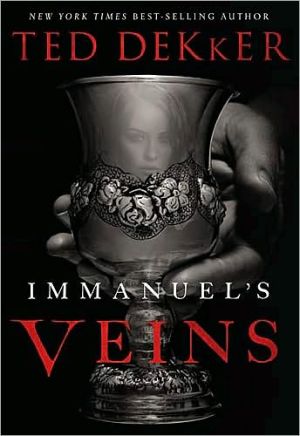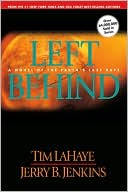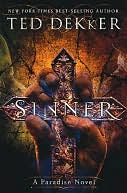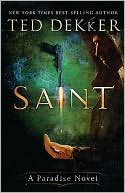The Moses Expedition
A lost treasure, a Nazi war criminal, and an expedition to find a legend . . .\ After fifty years in hiding, the Nazi war criminal known as the Butcher of Spiegelgrund has finally been tracked down by Father Anthony Fowler, a CIA operative and a member of the Vatican’s secret service. He wants something from the Butcher—a candle covered in filigree gold that was stolen from a Jewish family many years before.\ But it isn’t the gold Fowler is after. As Fowler holds a flame to the wax, the...
Search in google:
A lost treasure, a Nazi war criminal, and an expedition to find a legend . . . After fifty years in hiding, the Nazi war criminal known as the Butcher of Spiegelgrund has finally been tracked down by Father Anthony Fowler, a CIA operative and a member of the Vatican’s secret service. He wants something from the Butcher—a candle covered in filigree gold that was stolen from a Jewish family many years before. But it isn’t the gold Fowler is after. As Fowler holds a flame to the wax, the missing fragment of an ancient map that uncovers the location of the Ten Commandments given to Moses is revealed. Soon Fowler is involved in an expedition to Jordan set up by a reclusive billionaire. But there is a traitor in the group who has ties to terrorist organizations back in the United States, and who is patiently awaiting the moment to strike. From wartime Vienna to terrorist cells in New York and a lost valley in Jordan, The Moses Expedition is a thrilling read about a quest for power and the secrets of an ancient world. Publishers WeeklyIn Gómez-Jurado's unoriginal, intermittently exciting religious thriller, two characters from the Spanish author's internationally bestselling first novel, God's Spy—Fr. Anthony Fowler, who works for both the CIA and the Vatican secret service, and Andrea Otero, a plucky El Globo journalist—become involved in a secret archeology expedition to Jordan. Raymond Kahn, the eccentric and reclusive chief of Kayn Industries, hopes the team will recover that elusive treasure beloved by many school-of-Dan-Brown writers, the Ark of the Covenant. Several terrorist groups are targeting the expedition, and one by one people turn up dead. U.S. readers who just can't get enough of the Ark would be better off watching yet again the first Indiana Jones flick, The Raiders of the Lost Ark. (Mar.)
1\ RESIDENCE OF BALTHASAR HANDWURZ\ STEINFELDSTRAßE, 6KRIEGLACH, AUSTRIA\ Thursday, December 15, 2005. 11:42 a.m.\ The priest wiped his feet carefully on the welcome mat before knocking on the door. After tracking the man for the past four months, he had finally discovered his hiding place two weeks ago. He was now sure of Handwurz’s true identity. The moment had come to confront him.\ He waited patiently for a few minutes. It was almost noon and Graus would be having his customary midday nap on the sofa. There was hardly anyone in the narrow street at that hour. His neighbors on Steinfeldstraße were at work, unaware that at Number 6, in a small house with blue curtains at the windows, a genocidal monster was peacefully dozing in front of his TV set.\ Finally the sound of a key in the lock warned the priest that the door was about to open. The head of an elderly man with the venerable air of someone in an advertisement for medical insurance appeared from behind the door.\ “Yes?”\ “Good morning, Herr Doktor.”\ The old man looked the person who was addressing him up and down. The latter was tall, thin, and bald, about fifty years of age, with a priest’s collar visible under his black coat. He stood on the doorstep with the rigid posture of a military guard, his green eyes observing the old man intently.\ “I think you’re mistaken, Father. I used to be a plumber, but now I’m retired. I’ve already contributed to the parish fund, so if you’ll excuse me . . .”\ “You aren’t by any chance Dr. Heinrich Graus, the famous German neurosurgeon?”\ The old man held his breath for a second. Aside from that, he did nothing that might give him away. However, that small detail was enough for the priest: proof positive.\ “My name is Handwurz, Father.”\ “That’s not true and we both know it. Now, if you’ll let me in, I’ll show you what I’ve brought with me.” The priest raised his left hand, in which he held a black briefcase.\ The door swung open in response and the old man limped quickly toward the kitchen, the ancient floorboards protesting with each step. The priest followed but paid little attention to the surroundings. He had peered in through the windows on three separate occasions and already knew the location of each item of cheap furniture. He preferred keeping his eyes fixed on the old Nazi’s back. Even though the doctor walked with some difficulty, the priest had seen him lifting sacks of coal from the shed with an ease that a man decades younger might have envied. Heinrich Graus was still a dangerous man.\ The small kitchen was dark and smelled rancid. It had a gas stove, a counter on which sat a dried-up onion, a round table, and two unmatched chairs. Graus gestured for the priest to sit down. The old man then rummaged through a cupboard, took out two glasses, filled them with water, and set them on the table before taking a seat himself. The glasses remained untouched as the two men sat there, impassive, regarding each other for over a minute.\ The old man was dressed in a red flannel bathrobe, cotton shirt, and worn trousers. He had started going bald twenty years earlier, and the little hair he had left was completely white. His large round glasses had gone out of style before the fall of Communism. The relaxed expression around his mouth lent him a good-natured air.\ None of this fooled the priest.\ Dust particles floated in the shaft of light created by the weak rays of the December sun. One of them landed on the priest’s sleeve. He flicked it away without taking his gaze from the old man.\ The smooth certainty of the gesture did not go unnoticed by the Nazi, but he’d had time to recover his composure.\ “Aren’t you going to have some water, Father?”\ “I’m not thirsty, Dr. Graus.”\ “So you’re going to insist on calling me by that name. My name is Handwurz. Balthasar Handwurz.”\ The priest paid no heed.\ “I have to admit, you’re pretty sharp. When you got your passport to leave for Argentina, no one imagined that you’d return to Vienna a few months later. Naturally it was the last place I looked for you. Only forty-five miles from Spiegelgrund Hospital. The Nazi hunter Wiesenthal searched for years in Argentina, unaware that you were a short ride away from his office. Ironic, don’t you think?”\ “I think it’s ridiculous. You’re American, aren’t you? You speak German well, but your accent gives you away.”\ The priest lifted his briefcase onto the table and removed from it a worn folder. The first document he held up was a photo of a younger Graus, taken at the hospital at Spiegelgrund during the war. The second was a variation of the same photo, but with the doctor’s features aged, thanks to a software program.\ “Isn’t technology great, Herr Doktor?”\ “That doesn’t prove a thing. Anyone could have done that. I watch television too,” he said, but his voice betrayed something else.\ “You’re right. It doesn’t prove anything, but this does.”\ The priest took out a yellowing sheet to which someone had stapled a black-and-white photo, on top of which was written in sepia letters: TESTIMONIANZA FORNITA, next to the stamp of the Vatican.\ “‘Balthasar Handwurz. Blond hair, brown eyes, strong features. Identifying marks: a tattoo on his left arm with the number 256441, put there by the Nazis during his stay at the concentration camp at Mauthausen.’ A place you never set foot in, Graus. Your number is a false one. The person who did your tattoo made it up on the spot, but that’s the least of it. Until now, it’s worked.”\ The old man touched his arm through the flannel bathrobe. He was pale with anger and fear.\ “Who the hell are you, you bastard?”\ “My name is Anthony Fowler. I want to cut a deal with you.”\ “Get out of my house. Right now.”\ “I don’t think I’m making myself clear. You were second in command at Am Spiegelgrund Children’s Hospital for six years. It was a very interesting place. Almost all the patients were Jewish and they suffered from mental illness. ‘Lives not worth living,’ isn’t that what you called them?”\ “I don’t have the slightest idea what you’re talking about!”\ “Nobody suspected what you were doing there. The experiments. Cutting children up while they were still alive. Seven hundred and fourteen, Dr. Graus. You killed seven hundred and fourteen of them with your own hands.”\ “I told you—”\ “You kept their brains in jars!”\ Fowler smashed his fist on the table so hard that both glasses toppled over, and for a moment the only sound was that of the water dripping onto the tiled floor. Fowler took a few deep breaths, attempting to calm himself.\ The doctor avoided looking into the green eyes that seemed ready to cut him in half.\ “Are you with the Jews?”\ “No, Graus. You know I’m not. If I were one of them, you’d be dangling from a noose in Tel Aviv. My . . . affiliation is with the people who facilitated your escape in 1946.”\ The doctor repressed a shiver.\ “The Holy Alliance,” he muttered.\ Fowler did not reply.\ “And what does the Alliance want from me after all these years?”\ “Something in your possession.”\ The Nazi gestured at his surroundings.\ “As you can see, I’m not exactly a rich man. I have no money left.”\ “If I were after money, I could easily sell you to the attorney general in Stuttgart. They’re still offering 130,000 euros for your capture. I want the candle.”\ The Nazi stared at him blankly, pretending not to understand.\ “What candle?”\ “Now you’re the one being ridiculous, Dr. Graus. I’m talking about the candle you stole from the Cohen family sixty-two years ago. A heavy candle without a wick, covered with gold filigree. That’s what I want and I want it now.”\ “Take your bloody lies elsewhere. I don’t have any candle.”\ Fowler sighed, leaned back on his chair, and pointed at the upturned glasses on the table.\ “Do you have anything stronger?”\ “Behind you,” Graus said, nodding toward a cupboard.\ The priest turned and reached for a bottle that was half full. He picked up the glasses and poured two fingers of bright yellow liquid into each. Both men downed the drinks without making a toast.\ Fowler grabbed the bottle again and poured another round. He took a sip, then said: “Weizenkorn. Wheat schnapps. It’s been a long time since I tasted this.”\ “I’m sure you haven’t missed it.”\ “True. But it’s cheap, isn’t it?”\ Graus shrugged his shoulders.\ “A man like you, Graus. Brilliant. Vain. I can’t believe you drink this. You’re slowly poisoning yourself in a dirty hole that smells of piss. And you want to know something? I understand . . .”\ “You don’t understand a thing.”\ “Well done. You still remember the techniques of the Reich. Officers’ Regulations. Section Three. ‘In the event of capture by the enemy, deny everything and give only short answers that will not compromise you.’ Well, Graus, get used to it. You’re compromised up to your neck.”\ The old man pulled a face and poured himself the rest of the schnapps. Fowler watched his opponent’s body language as the monster’s resolve slowly crumbled. He was like a painter stepping back after a few brushstrokes to examine the canvas before deciding which colors to use next.\ The priest decided to try using the truth.\ “Look at my hands, Doctor,” said Fowler, placing them on the table. They were wrinkled, with long delicate fingers. There was nothing strange about them except for one small detail. At the top section of each finger near the knuckles was a thin whitish line that continued right across each hand.\ “Those are ugly scars. How old were you when you got them? Ten? Eleven?”\ “Twelve. I was practicing the piano: Chopin Preludes, Opus 28. My father came over to the piano and, without any warning, slammed the lid of the Steinway down as hard as he could. It was a miracle I didn’t lose my fingers, but I was never able to play again.”\ The priest gripped his glass and seemed to lose himself in its contents before going on. He had never been able to acknowledge what had happened while looking another human being in the eye.\ “From the time I was nine years old my father . . . forced himself on me. That day I told him I was going to tell someone if he did it again. He didn’t threaten me. He simply destroyed my hands. Then he cried, asked me to forgive him, and called on the best doctors money could buy. No, Graus. Don’t even think about it.”\ Graus had slid his hand under the table, feeling for the cutlery drawer. He quickly withdrew it.\ “That’s why I understand you, Doctor. My father was a monster whose guilt went beyond his own capacity to forgive. But he had more guts than you. Rather than slowing down in the middle of a sharp curve, he stepped on the gas and took my mother with him.”\ “A very moving story, Father,” Graus said in a mocking tone.\ “If you say so. You’ve been hiding in order to avoid facing your crimes, but you’ve been found out. And I’m going to give you what my father never had: a second chance.”\ “I’m listening.”\ “Give me the candle. In turn you’ll get this file containing all the documents that would serve as your death warrant. You can go on hiding out here for the rest of your life.”\ “And that’s it?” said the old man incredulously.\ “As far as I’m concerned.”\ The old man shook his head and stood up with a tight smile. He opened a small cabinet and pulled out a large glass jar filled with rice.\ “I never eat grains. I have an allergy.”\ He emptied the rice onto the table. There was a small cloud of starch and a dry thud. Half buried in the rice was a package.\ Fowler leaned forward and reached for it, but Graus’s bony paw grabbed his wrist. The priest looked at him.\ “I have your word, right?” said the old man anxiously.\ “Is it worth anything to you?”\ “Yes, as far as I’m concerned.”\ “Then you have it.”\ The doctor let go of Fowler’s wrist, his own hands trembling. The priest carefully brushed off the rice and lifted out the dark cloth package. It was tied with twine. With great care he undid the knots and unwrapped the cloth. The faint rays of the early Austrian winter filled the filthy kitchen with a golden light that seemed at odds with the surroundings and the dirty gray wax of the thick candle lying on the table. At one time the candle’s entire surface had been covered by a thin sheet of gold worked in an intricate design. Now the precious metal had almost disappeared, leaving only traces of filigree on the wax.\ Graus smiled sadly.\ “The pawnshop took the rest, Father.”\ Fowler didn’t reply. He took out a lighter from his pants pocket and flicked it on. Then he stood the candle upright on the table and brought the flame to the top of it. Although there was no wick, the heat of the flame began to melt the wax, which gave off a nauseating smell as it slid down toward the table in gray drops. Graus looked on with bitter irony, as if he enjoyed being able to speak as himself after so many years.\ “I find it amusing. The Jew at the pawnshop has been buying Jewish gold for years, thereby supporting a proud member of the Reich. And what you’re witnessing now proves your search has been completely pointless.”\ “Appearances can be deceptive, Graus. The gold on this candle is not the treasure I’m after. It’s only a distraction for idiots.”\ Like a warning, the flame suddenly sputtered. A pool of wax had accumulated on the cloth below. At the top of what remained of the candle, the green edge of a metallic object was just about visible.\ “Good, it’s here,” said the priest. “Now I can leave.”\ Fowler stood up and folded the cloth around the candle once more, being careful not to burn himself.\ The Nazi watched in astonishment. He was no longer smiling.\ “Wait! What is that? What’s inside?”\ “Nothing that concerns you.”\ The old man stood up, opened the cutlery drawer, and pulled out a kitchen knife. With trembling steps he made his way around the table toward the priest. Fowler watched him, motionless. In the Nazi’s eyes burned the crazed fire of someone who had spent whole nights contemplating that object.\ “I have to know.”\ “No, Graus. We made a deal. The candle for the file. That’s all you get.”\ The old man raised the knife, but the expression on his visitor’s face made him lower it again. Fowler nodded and threw down the file on the table. Slowly, with the cloth bundle in one hand and his briefcase in the other, the priest backed toward the kitchen door. The old man picked up the file.\ “There are no other copies, right?”\ “Only one. The two Jews waiting outside have it.”\ Graus’s eyes nearly leaped out of their sockets. He raised the knife again and advanced toward the priest.\ “You lied to me! You said you’d give me a chance!”\ Fowler looked at him impassively one last time.\ “God will forgive me. Do you think you’ll have as much luck?”\ Then, without another word, he disappeared into the hallway.\ The priest walked out of the building clutching the precious package to his chest. Two men in gray coats stood guard several feet from the door. Fowler warned them as he passed: “He has a knife.”\ The taller of the two cracked his knuckles and a small smile played on his lips.\ “Even better,” he said.\ © 2010 JUAN GÓMEZ-JURADO
Introduction 6Part 1 Making Life Miserable for the Liberal Party 9Part 2 Keating's Way with Words 38Part 3 KEATING! The Musical We Had to Have 174Further Reading 184Acknowledgments 186Illustration Sources 187Index 189
\ Publishers WeeklyIn Gómez-Jurado's unoriginal, intermittently exciting religious thriller, two characters from the Spanish author's internationally bestselling first novel, God's Spy—Fr. Anthony Fowler, who works for both the CIA and the Vatican secret service, and Andrea Otero, a plucky El Globo journalist—become involved in a secret archeology expedition to Jordan. Raymond Kahn, the eccentric and reclusive chief of Kayn Industries, hopes the team will recover that elusive treasure beloved by many school-of-Dan-Brown writers, the Ark of the Covenant. Several terrorist groups are targeting the expedition, and one by one people turn up dead. U.S. readers who just can't get enough of the Ark would be better off watching yet again the first Indiana Jones flick, The Raiders of the Lost Ark. (Mar.)\ \ \ \ \ Library JournalIndiana Jones meets The Da Vinci Code in this fast-paced thriller by the Spanish author of the successful God's Spy. After extricating a map hidden decades ago in a candle by a Nazi war criminal, Fr. Anthony Fowler—an agent of both the CIA and the Holy Alliance—joins an archaeological dig called the Moses Expedition. Financed by the eccentric agoraphobic Raymond Kayn, this expedition aims to unearth the Arc of the Covenant. Soon, we learn that a key member of the expeditionary team is an Islamic terrorist whose fellow terrorists intend to abort the mission. The plot is full of ironic twists, including the identity of the turncoat and the reason for Kayn's obsession with the mission. To create tension, Gómez-Jurado digs into a panoply of cinematographic devices. The characters are assaulted by sandstorms, scorpions, and vicious red ants, to name a few, and just when the reader thinks the author has exhausted all possibilities, he conjures up something equally startling. Readers familiar with God's Spy will delight in the reappearance of Father Fowler and Andrea, two of only a handful of survivors of that book's debacle. VERDICT A well-written thriller with an exciting plot and well-drawn characters. For thriller fans, what's not to like?—Lawrence Olszewski, OCLC Lib., Dublin, OH\ \ \ Kirkus ReviewsThe Ark of the Covenant represents a tantalizing prize (yes, again!) in this suspense melodrama from the Spanish author of God's Spy (2007). There's an echo of Raiders of the Lost Ark in the Nazi who opens the story, the "genocidal monster" who performed lethal experiments on Jewish children, one of whose brothers escaped to America. Years later in 2006, Raymond Kayn, now a reclusive New York billionaire, sends Father Anthony Fowler (ex-CIA, now Vatican Secret Service) to Austria to retrieve a family heirloom from the ancient Nazi. It contains a scroll that details the location of the Ark in the Jordanian desert. Kahn also commissions a Spanish journalist, Andrea Otero, to cover the top-secret expedition. (Fowler and Otero are holdovers from God's Spy, and Kahn needs them both at the site. Exactly why is murky.) There are so many characters they all but trip over each other, and there's no one narrator to hold everything together; curiously, it's the brash lesbian Andrea who gets the most attention. The unwieldy expedition arrives in the desert, unaware that Islamic terrorists have preceded them. They are following the orders of shadowy mastermind Huqan, a double agent; when his identity's finally revealed, it's sheer unforeshadowed silliness. But he keeps it moving! If the author knows nothing else, he knows how to do that, cross-cutting between the desert and Washington, where a sleuth is on Huqan's trail. Too bad he dispels the suspense with a chapter heading proclaiming the expedition a disaster. Still, the intrigues continue. Kahn, Fowler and the Vatican-they all have their hidden agendas. Then there's the irrelevant melodrama: the evil Colombian security guard who sets scorpions onAndrea and killer ants on Fowler, the jihadist in Washington who tortures the sleuth with skewers. As the team closes in on the Ark, bombs go off and bodies pile up and a horrendous sandstorm claims the rest. A second novel that has the trappings of suspense fiction but none of its substance.\ \ \ \ \ From the Publisher"Better take a deep breath before opening this novel—Gomez-Jurado leaves no time for a second one until you finish the last page."\ —Javier Sierra, bestselling author of The Secret Supper and The Lady in Blue\ "The Moses Expedition delivers the best of the literary suspense and international intrigue genres with breakneck thrills and twists, and Gomez-Jurado enriches every page with a sophisticated portrayal of characters and a deep respect for history. This fantastic novel will have your brain working overtime and your bedside lamp on into the night."\ —Matthew Pearl, New York Times bestselling author of The Dante Club and The Last Dickens\ "History, secrets, conspiracies, action, adventure, this is my kind of story. The Moses Expedition is fraught with intrigue and plot twists galore. Juan Gomez-Jurado is a writer who knows how to deliver exactly what readers want. He's in the top echelon of the world's thriller writers and well worth a look. Settle back and savor this perfect piece of entertainment."\ —Steve Berry, New York Times bestselling author of The Paris Vendetta\ "A thrilling quest novel by a terrific new talent... this tale is going to cost you some serious sleep."\ —Stephen Coonts, New York Times bestselling author of The Disciple\ "Nazis, Israelis, archaeologists, terrorists, a reclusive billionaire, a mysterious Vatican priest, hidden treasures, secret maps, the Lost Ark, the Dead Sea Scrolls... A heart-pounding thriller, jam-packed with two thousand years of Middle Eastern intrigue."\ —Katherine Neville , New York Times bestselling author of The Eight\ "A perfectly balanced, fast-paced, and compelling thriller.... Already an international bestseller, it’s also certain to draw the American wing of the still-unsatiated Da Vinci Code crowd."\ —Starred Booklist review\ "Juan Gomez-Jurado has created a true masterpiece. The Moses Expedition is a brilliant thriller —sharp, suspenseful, and engrossing. This is what great thriller writing is all about and why Jurado has vaulted to the top of my list of must-read authors!" —Brad Thor, #1 New York Times bestselling author of Foreign Influence\ "A book that Dan Brown must surely wish he had written.... Tense, rollicking and atmospheric, this is a book not to be missed." —BestThrillers.com\ \ \ \ \ \ BooklistStarred Review\ A perfectly balanced, fast-paced, and compelling thriller.... Already an international bestseller, it's also certain to draw the American wing of the still-unsatiated Da Vinci Code crowd."--\ \ \
